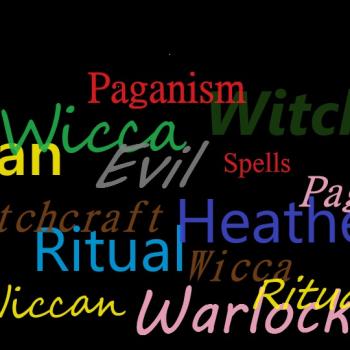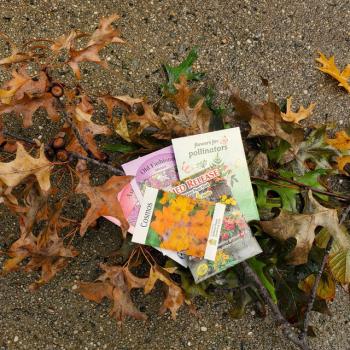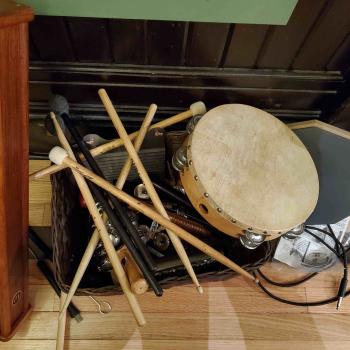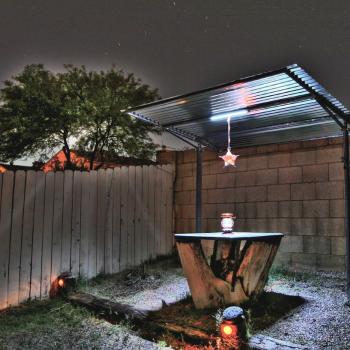This Sunday, the Women’s Ritual Circle at the Unitarian Universalist Fellowship of Harford County will lead the morning worship service in an observance of Ostara. I have been told that it’s been five or more years since the Circle has led a Sunday morning service and we are all very excited about the activities, readings, and songs we have selected to share. We have met both in person and virtually to discuss details and assign responsibilities. But the first stage of this planning process started with some serious conversation around the general purpose and tone of the service and how our group should handle the fact that most of our members are not pagans and many probably don’t know anything about our group or paganism itself.

When I first agreed to be the coordinator for the Ostara service, I immediately envisioned a full-blown Ostara ritual, following the flexible standard that our group has developed over the years for our sabbath ceremonies. With all the chairs in the auditorium turned toward a central alter, we would offer a spirit cleansing for members as they entered, call the four quarters, and cast the largest circle I’ve ever been a part of. We would lead chants, we would explain the history of Ostara, and in the end we would ground our energy and open the circle, sending everyone back out into the world refreshed and, dare I say, perhaps a little more enlightened. Everyone would be moved and filled with joy. I was dreaming big.
But soon a thought occurred to me. What would our Christian members think? How would our Jewish members feel? How would our visitors react? The blurb about the ceremony in our weekly announcements would probably not provide enough information to prepare them for such an experience or to even enable them to make an informed decision about whether or not such a service was something they’d be comfortable participating in. Yet, on the other hand, we are UUs and we are welcoming of pagan and Wiccan beliefs. Judgement and scorn are not supposed to be the UU way. And we should be proud of our beliefs and practices, because they are good beliefs and practices.
I finally decided to reach out to the founder of the Circle for her advice. She confirmed that my concerns were valid by telling me that in the past she had led Sunday services that centered around the casting of a circle, but had decided years ago that she wasn’t going to do that again. Her reasoning was that the people who come to the service should be able to choose whether or not they want to be part of a formal ritual and not feel like they are being forced into any unfamiliar activity against their will. She also told me that there had been times when some of the attendees chose to stand outside the circle the entire time, as was their prerogative, observing the ceremony. When she said this, I immediately recalled the way I’ve felt when I’ve participated in sabbath rituals while others were watching from outside. I find it makes me uncomfortable as I wonder what that person or persons is thinking and it makes it almost impossible for me to focus on the activities that I love so much. Pagan rituals are participation events, not performance events.
I spent the next couple of days thinking about her words and considering my own thoughts on the matter. I really wanted to do a proper Ostara ritual with my Circle friends and to introduce the magic of our ceremonies to others who might enjoy it as much as we do. But what ultimately helped me make my decision was the thought of a first time visitor coming into our auditorium with no notion of what the morning’s service was about. Our fellowship has experienced exciting growth over the past couple of years, and there are almost always one or two first time visitors at our services. What if someone who was weighing the momentous decision of leaving the faith tradition of their upbringing was permanently scared away from Unitarian Universalism by a pagan ritual that they were not emotionally or spiritually prepared for? Would a first time visitor assume that all of our services were pagan? I finally determined that I would rather offer a newcomer-friendly service than a ritual that someone might find uncomfortable.
So, as UUs often do, our Women’s Ritual Circle came up with what I feel is a beautiful compromise. We are following the normal Sunday morning order of service with slight modifications. We will place the chairs in the auditorium into a circle facing in toward an alter which we will decorate with flowers, eggs, seeds, and such. Our regular UU chalice will be temporarily replaced with a terra cotta candle holder shaped like a group of people standing in a circle with their arms around each other. Our founder will tell a favorite story about Ostara for the children’s time.
I will deliver a brief explanation about who we are and what our group does, followed by an even briefer description of Ostara. I have had a lovely Wheel of the Year graphic printed on an insert in our order of service. One of our members has written a beautiful explanation about why and how we call the quarters, and then other members will read a sentence about qualities generally associated with each direction in order: East, South, West, North, Center, and we will offer a brief time in between for attendees to state out loud qualities they associate with that direction. This is something that we often do in our full rituals, and is an interactive activity I particularly enjoy.
Next, several members of our Women’s Ritual Circle have volunteered to make a short statement about what the Circle means to them and what Ostara or Spring Equinox means to them. We are a diverse group, and we felt this would be the best way to celebrate our differences and our similarities. We will culminate the main part of the service with a seed planting activity that will allow participation by everyone who is willing.
Interspersed with all of this, we will lead the singing of some of our favorite chants, the words of which have been printed in the order of service to make it easier for attendees to join in. Our invocation and benediction are pagan and earth-centered. In our regular sabbath rituals, we always open our circle with the song, “Merry Meet.” On Sunday we will close our service by singing this song as we extinguish our chalice. I know that during this time, in my heart, I will be opening the circle of love that I frequently feel at our Sunday services and sending the positive energy cultivated during our ceremony out into the world with all of the attendees.
Have we made the right decision in not casting a circle and having a full Ostara ritual this weekend? I think we probably have, but perhaps we haven’t. Sometimes I’m envious of other UU congregations that have paganism as their base or even as strong pillar of their foundation. I suppose that each fellowship has its own needs and traditions and that we must tailor all of our Sunday services, not just the pagan ones, to meet the needs of the members and visitors. My hope is that one or more people in our Ostara ceremony will be intrigued by our group and decide to visit or join us during our regular sabbath observances. Perhaps someone will say to her or himself, “I wish I had known this group existed! They are perfect for me!”
Ultimately, my dream is that someday we’ll be able to hold full Women’s Circle Rituals during Sunday morning services and cast our circle with the knowledge that others will already understand and appreciate what we are doing and happily join in, even if paganism is not part of their own spiritual path. Maybe our modified service this Sunday will bring us one step closer to that reality.
















